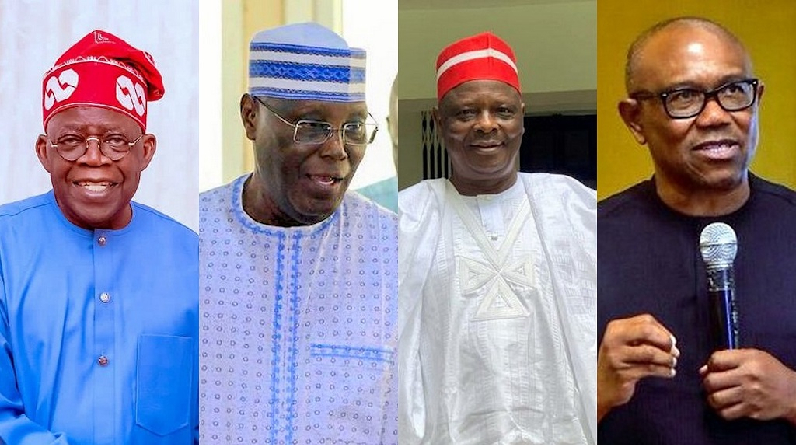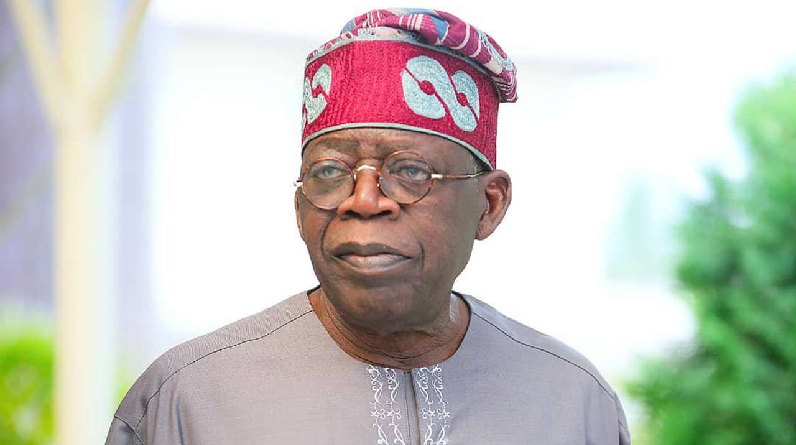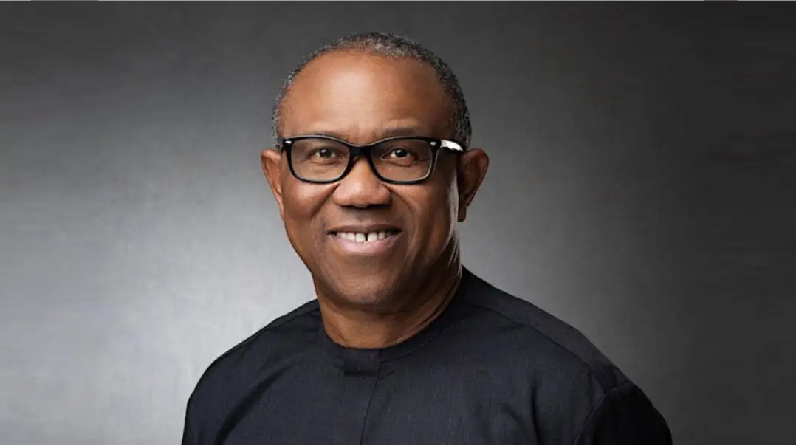The Claims Against The Presidential Candidates In Nigeria’s 2023 Elections

Next month, Nigerians will elect a new president from among 18 candidates, but the three front-runners have each been accused of drug trafficking, money laundering, and international tax evasion. Despite the fact that none of them have ever been charged, which would exclude them from running for office, the high-profile claims have cast doubt on their eligibility.
Auwal Rafsanjani, head of Transparency International’s Nigerian branch, described the decision-making process as “choosing between lousy candidates” and emphasised how rampant corruption has resulted in devastating levels of underdevelopment and poverty in the oil-rich country. Bola Tinubu of the ruling All Progressives Congress, Atiku Abubakar of the People’s Democratic Party, and Peter Obi of the Labour Party are the three leading candidates. All three claim to have achieved success legally and reject any misconduct.
Bola Tinubu’s documents:

The contender who has received the most attention is Mr. Tinubu, a two-term governor of Lagos, the wealthiest state in Nigeria. There are countless arguments concerning his age, name, health, employment history, and the validity of his university diploma, but the source of his income has drawn the greatest criticism. Although there are no official statistics, many people think that Mr. Tinubu, 70, is one of Nigeria’s wealthiest leaders. His residence, which is located in a large complex in Lagos’ affluent Ikoyi neighbourhood, is the most prominent example of his wealth. On election day in 2019, observers saw two armoured cars that resembled the bullion vans that banks employ to move cash driving through his gates, which was an uncommon sight. The ensuing allegations that he had engaged in vote buying were refuted by his advisors.
But there have been some concerns about his wealth. He claimed to have inherited some real estate in December, which he subsequently put to use, although in the past he claimed to have became a “instant billionaire” while employed as an auditor at Deloitte & Touche. He claimed to have saved $1.8 million (£1.5 million) from his salaries and other benefits, almost the same sum that was discovered in accounts connected to him in a 1993 legal fight with US authorities. According to publicly available records, the US Department of Justice claimed that beginning in early 1988, accounts opened in Bola Tinubu’s name contained the proceeds of sales of the illegal drug white heroin.
According to Kevin Moss, the special agent who looked into the operation, Mr. Tinubu was a subcontractor for their main suspect, Adegoboyega Akande. The agent claimed Mr. Tinubu confessed over the phone that he knew Mr. Akande at first, but later changed his story and claimed he had no business dealings with him. Although Mr. Tinubu and the other defendants rejected the accusations, the court acknowledged that it had reason to suspect the funds in the bank accounts were the proceeds of drug trafficking. As a result, the court never made a decision about the money’s source.
Instead, Mr. Tinubu made a compromise agreement with the police and forfeited $460,000; he was not directly charged with anything related to the money. Festus Keyamo, Mr. Tinubu’s spokesman, asserted that the assets confiscated were part of a civil forfeiture rather than a criminal one. Mr. Tinubu has consistently denied any connections to the drug trade. He also came to an amicable agreement with accountant Oladapo Apara, who had a dispute with Mr. Tinubu, last year. When Mr. Tinubu was governor, Mr. Apara was a founding member of Alpha Beta Consulting, which still maintains the lucrative contract to monitor taxes in the state of Lagos.
According to the accountant, Mr. Tinubu controlled 70% of the company through proxies, and the firm received a 10% commission on sales, which he calculated to total $3.48 billion between 2002 and 2018. Mr. Tinubu disputes this, asserting that he does not get commissions on taxes collected by the government of Lagos State. According to Mr. Apara, he was fired from the company in 2010 after reporting possible financial misappropriation and starting a protracted legal struggle to seek redress. He claimed that as the company’s creator, he could not be fired and wanted payment from Mr. Tinubu, which led to a legal dispute in 2021.
He also claimed to have written to Nigeria’s financial crimes watchdog in September 2018 to accuse Alpha Beta of tax evasion; however, the actual letter that accompanied the claim has since been removed from his account. The claims were refuted by Alpha Beta, which also claimed that Mr. Apara had been fired for fraud, which he rejected. Although Mr. Tinubu has continuously denied having any connection to the company, he participated in an unreported settlement last June that ended the parties’ legal disputes between Alpha-Beta and Mr. Apara. Mr. Tinubu was questioned by the BBC regarding the settlement, the US claims, and the issues surrounding his riches, but he chose not to respond.
See Also: Nonprofits and experts accuse Amazon of being greedy by ending its charity programme. AmazonSmile
BOLA TINUBU: The “godfather” of Lagos sets his sights on conquest Nigeria:
United States Senate and Atiku Abubakar, As the most experienced candidate on the ballot, Mr. Abubakar boasts of his tenure as vice president from 1999 to 2007—the time frame that has generated some criticism. Olusegun Obasanjo, his former boss, charged him in 2003 of stealing $145 million from the Petroleum Technology Development Fund (PTDF). Mr. Obasanjo, who is not averse to airing his ideas in public against other politicians, included a chapter in his 2014 book My Watch about the alleged wrongdoings of his former deputy.
Mr. Abubakar refuted the allegations, claiming that $145 million was placed in commercial banks to earn interest before being invested in PTDF projects. The 76-year-old claimed that his first sources of income were farming and home ownership in his native state of Adamawa. He claimed to have had “a good nose for money” from an early age. He was a former customs officer. He founded an oil-servicing business in the 1980s, which propelled him into the upper class. His detractors claim he violated a statute that forbids civil workers from working in any private industry other than farming. The representative for Mr. Abubakar described his endeavour as a type of small company that many government employees operate, such as operating a cab service or opening a storefront to provide for their family.
“Only to earn interest did he invest his income. As you suggest, he wasn’t engaged in any other type of private employment “told the BBC, Paul Ibe. A US Senate committee investigation from 2010 said that between 2000 and 2008, Mr. Abubakar transported more than $40 million in “suspect cash” through offshore shell firms into the US through one of his four wives. According to the research, Siemens, a German technology giant that admitted guilt to bribery charges in 2008 and agreed to pay a $1.6 billion fine, was responsible for at least $1.7 million of this sum.
He also played a significant role in the prosecution of former US Congressman William Jefferson for corruption. According to the Senate report, Mr. Jefferson called Mr. Abubakar “very corrupt” and claimed that he required money to bribe him into approving a US company’s commercial dealings in Nigeria. In 2009, Mr. Jefferson was found guilty and given a sentence of 13 years in jail, which was later reduced. Both Mr. Abubakar and his now-divorced wife are not subject to criminal prosecution in the US since they have repeatedly denied any wrongdoing. In Nigeria or any other country, Atiku Abubakar is not being tried for corruption or any other wrongdoing, according to Mr. Ibe.
“Only after being charged by a court of law can he be declared unsuitable for public service. This is not the case.”The person who wants Nigerians to look back in order to move forward is ATIU ABUBAKAR.
The papers from Pandora and Peter Obi:

Peter Obi, who has also held the office of governor twice, most recently in the Anambra state in the east, is open about his enormous riches, which he claims to have accumulated through business dealings and the importation of various commodities into Nigeria. Many people were shocked when they saw his name mentioned in the Pandora Papers in 2021. He was known as “Mr Clean” by his fans since he was a rare Nigerian politician who had never been accused of embezzling public cash. This was a leak of about 12 million papers that exposed the hidden wealth, tax evasion, and, in some cases, money laundering claims of some of the world’s most wealthy and influential people.
One of the newspapers working on the Pandora Papers investigation, Nigeria’s Premium Times, claimed that the records proved that in 2010, when Mr. Obi was the governor of Anambra, he established a corporation in the British Virgin Islands bearing his daughter’s name to aid in tax evasion. While opening overseas bank accounts while holding public office is prohibited, using a tax haven is not prohibited. The Premium Times claimed that this demonstrated Mr. Obi had neglected to disclose his assets and that he had continued to serve as director of Next International, a UK-registered company, after taking office as governor, thereby engaging in private business, which is prohibited for public officers. After 14 months of his service, he officially resigned.
None of the revelations have resulted in a criminal charge against the 61-year-old. According to Mr. Obi, an impeachment hearing that looked into the charges involving his commercial interests in 2006 determined that he had acted legally. He continued by saying that he had set up a blind trust to manage all of his commercial dealings, including the family’s offshore holdings. A blind trust is permissible under the law, he declared. Additionally, Mr. Obi has been charged with conflict of interest for allegedly investing $20 million in a brewery owned by his family through Next while serving as governor. He refutes the accusations, stating that Anambra has profited significantly from the investment over time.
The fact that Anambra invested in Fidelity Bank, where he previously served as chairman, has also drawn criticism. He told the BBC that the reason why Anambra state invested in Fidelity Bank, where he has interests, is because it is a publicly traded corporation, denying that any of the financial disclosures raise questions about his suitability for office. PETER OBI, the thrifty businessman who is winning the hearts of young Nigerians
Leave a reply
You must be logged in to post a comment.








